Biden Issues Executive Order To Deal With Hostage-Takers
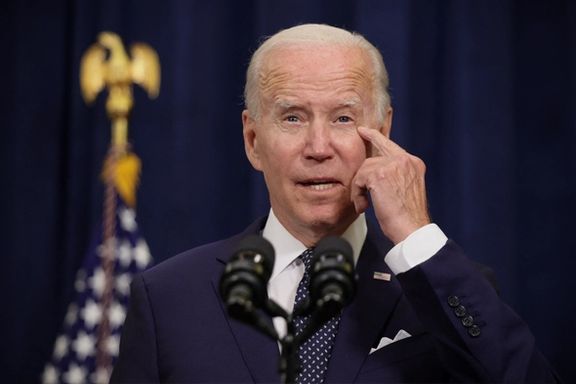
US President Joe Biden has issued an executive order to expand tools available to deter and disrupt hostage-taking and wrongful detentions of Americans.

US President Joe Biden has issued an executive order to expand tools available to deter and disrupt hostage-taking and wrongful detentions of Americans.
Declaring a urgent need to deal with this threat, Biden on Tuesday authorized agencies to impose costs and consequences, including financial sanctions and visa bans, on malicious actors involved in hostage-taking, and charges agencies with developing new methods to deter hostage taking.
Foreign governments and human rights organizations have accused Iran of detaining foreigners and dual nationals on trumped up charges to use them for getting concessions from Western countries. US citizens Siamak Namazi and his father Baquer (Bagher) Namazi, Emad Shargi, and Morad Tahbaz and permanent resident Shahab Dalili are among the dual nationals or foreigners held in Iran on such charges. Iran also holds citizens of several countries including Germany, Austria, and Sweden, as de facto hostages.
In the executive order, known as Bolstering Efforts to Bring Hostages and Wrongfully Detained United States Nationals Home, Biden said “Terrorist organizations, criminal groups, and other malicious actors who take hostages for financial, political, or other gain — as well as foreign states that engage in the practice of wrongful detention, including for political leverage or to seek concessions from the United States.”
The US government must redouble its efforts at home and with partners abroad to deter these practices and to secure the release of those held as hostages or wrongfully detained, read the order.
“I therefore determine that hostage-taking and the wrongful detention of United States nationals abroad constitute an unusual and extraordinary threat to the national security, foreign policy, and economy of the United States,” he said.
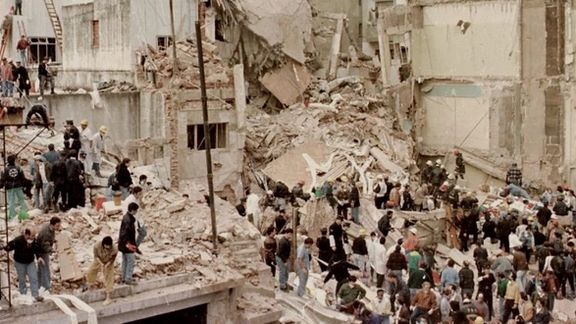
Some Argentinian and American officials have held Iran accountable on the anniversary of the 1994 AMIA bombing that killed 85 people and injured over 300.
July 18 marked the anniversary of the bombing of the Asociación Mutual Israelita Argentina (AMIA), a Jewish community center in Buenos Aires in Argentina and the 2012 attack on a tour bus in Burgas, Bulgaria, carrying Israeli tourists, both blamed on Iran-backed Lebanese group Hezbollah with direct involvement of high-level Iranian government officials.
State Department Spokesperson Ned Price said in a statement on Monday that the two heinous Hezbollah attacks were carried out with Iranian support, describing it as “the single deadliest antisemitic attack in more than half a century.”
“The AMIA bombing underscored Hezbollah’s global ambitions and is a clear example of Iran’s support of international terrorism,” he said, adding “While no one responsible for the attack has been brought to justice, the United States believes all Argentines deserve to have those responsible held accountable for this despicable and cowardly attack.”
He also referred to the 2012 attack on a tour bus in Burgas, Bulgaria, carrying Israeli tourists, saying Hezbollah murdered five Israeli tourists and a Bulgarian bus driver in the bomb attack, which also injured 45 Israeli youth traveling on the bus. “While Bulgarian courts convicted two Hizballah operatives in absentia in connection with the bombing, justice has yet to be served.”
“The United States is committed to countering Hezbollah and Iran’s malign influence. The funding, training, weapons, and other support Iran provides Hezbollah support complex and heinous terrorist attacks like these,” Price said. “The callous murder of civilians must not stand.”
He also referred to “national level designations, bans, or other restrictions against Hezbollah,” urging “more countries to take similar measures, which make it harder for the group and its backers in Tehran to threaten peace and security around the globe.”
Echoing Price’s remarks, US Special Envoy to Monitor and Combat Antisemitism Deborah Lipstadt, who is in Argentina on the anniversary of the event, reaffirmed the US support of Argentine Jews in "seeking accountability for the horrific actions of that day."
At the ceremony remembering the victims of the attack, AMIA president, Amos Linetzky, said "How can so much impunity be explained? The AMIA incident is one of the most shameful events in Argentine history" and is "an image that shows us to (have experienced) a humiliating failure."
As Argentina commemorated the 28th anniversary of the bomb attack on Monday, the country’s authorities demanded justice, given that nobody has ever been arrested for the attack.
They also called for greater efforts against "the terrorist threat" to the region, referring to a Venezuelan-Iranian jet that has been impounded in Argentina over links with the Revolutionary Guard.
Iran has denied that a Boeing 747 belongs to Iran’s Mahan Airlines -- sanctioned by the US in 2008 for its links to Tehran’s extraterritorial intelligence and secret ops outfit, the IRGC’s Quds (Qods) Force, but there are reports that at least one of the Iranian crew of the grounded Venezuelan cargo plane was a member of the Revolutionary Guards' Quds Force.
Among the Iranians on board is Gholamreza Ghasemi, who apparently was the pilot and is a member of the IRGC and a former board member of Fars Air Qeshm accused of transporting weapons for Hezbollah during the civil war in Syria. He is reportedly a relative of current Interior Minister Ahmad Vahidi, whose assignment by President Ebrahim Raisi triggered condemnation from Argentina given his suspected role in the AMIA bombing.
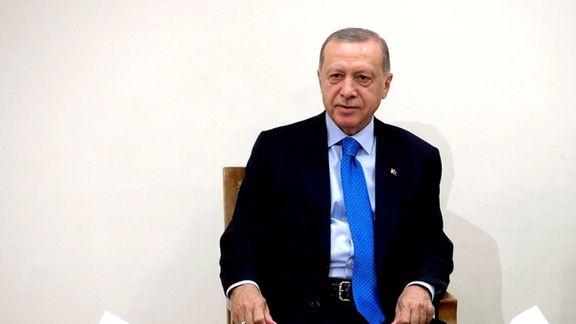
Meeting Turkey’s President Recep Tayyip Erdogan in Tehran noon Tuesday, Iran’s leader Ali Khamenei stressed the importance of Syria’s territorial integrity.
Tehran opposes any plan, being considered in Ankara, for expanded Turkish military intervention in Syria aimed variously at bolstering Syrian rebels, allowing refugees to return, and weakening Kurdish groups linked to Kurdish rebels inside Turkey.
Khamenei stressed Iran accepted Erdogan’s hatred of “terrorist groups,” presumably a reference to PYD (Democratic Union Party), which is linked to the Kurdistan Workers Party (PKK), active mainly in Turkey, and Pejak, which operates in Iranian Kurdistan. The Iranian leader said Tehran would cooperate with Turkey “against terrorism” and emphasized Tehran’s respect for Turkey’s security and borders.
But Khamenei also said that ‘terrorism’ in Syria was not limited to one group and suggested that an attack in north Syria would “benefit terrorists,” destabilize the region, and “impede Syria’s political actions.” Turkey has generally supported mainly Sunni rebels, including militant Islamist groups, against President Bashar al-Assad, who has been supported by both Iran and Russia.
Khamenei and Erdogan agreed on the importance, according to Iran’s official news agency IRNA, of resolving differences through negotiations, citing the Astana process between Turkey, Iran and Russia, whose president Vladmir Putin arrives in Tehran for a three-way summit on Tuesday.
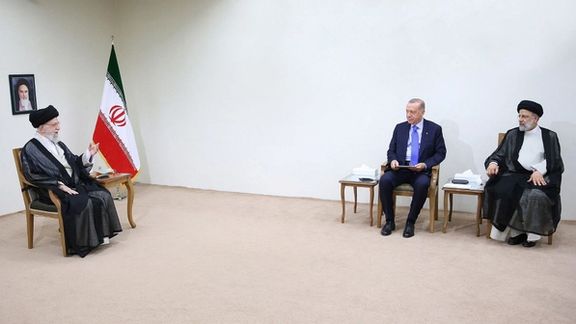
Both also stressed the importance of “Muslim unity,” with Khamenei describing the plight of the Palestinians as the most important issue for the “Islamic world.” Israel has a mixed relationship with Turkey, seen in Erdogan scaling back anti-Zionist rhetoric over the past two years and trade reaching around $7 billion in 2021, largely in Turkey’s favor.
IRNA noted Erdogan’s expressed opposition to unilateral sanctions – a reference to United States measures against Iran – and its commitment to Iran’s “legitimate expectations” from reviving the 2015 Iran nuclear deal, currently subject to year-long talks between Tehran and world powers.
Boosting trade
Khamenei talked of boosting economic links in both quantity and quality, saying Erdogan and Raisi would address the issue in other meetings. US ‘maximum pressure sanctions’ after 2018, threatening punitive action against third parties dealing with Iran, saw bilateral trade drop by around two-thirds by 2020 from $10.7 billion in 2017.
While analysts question figures suggesting trade has now rebounded beyond 5.6 billion in 2021, Erdogan said in Tehran he believed it could reach $30 billion.
Aside from resolving difference over Syria, where Russia continues its military presence in support of Assad, the three-way summit in Tehran is set to address a possible safe corridor through Turkey of grain from Ukraine and Russia. Iran is one of many countries importing grain from Russia and facing steep increases in prices with the Ukraine crisis.
The visit also comes in the wake of US President Joe Biden’s visit to Israel and Saudi Arabia, where he committed Washington to avoid leaving a “vacuum” in the Middle East to be filled by Russia, China, and Iran. Saudi Arabian officials have rejected talk of a new “defensive alliance” against Iran, as Riyadh continues to look to Moscow to coordinate global oil supplies through Opec+, which meets early in August.

Iran’s Revolutionary Guard says an Iranian LGBTQ rights activist detained since last October has been slapped with new charges of "trafficking Iranian women" to Erbil, in Iraqi Kurdistan.
The intelligence organization of the IRGC made the accusation in a statement on Monday about Zahra Mansouri Hamdani, also known as Sareh, who was previously arrested on charges linked to an appearance in a BBC documentary on gay rights in Iraqi Kurdistan.
The statement described her "the leader of the biggest gang of Iranian girls trafficking to Erbil,” saying that following months of surveillance, the IRGC intelligence tracked her to the trafficking gangs that had “sold hundreds of Iranian women and girls” to customers in Erbil.
The IRGC also accuses her of promoting homosexuality, gambling and fraud as well as de-stigmatization of illicit sexual relations in cyberspace.
The organization added that her gang was run in collaboration with a man identified as "Alireza Farjadi-Kia" and another woman that goes only by the name "Kati".
She was arrested while trying to cross the border and seek asylum in Turkey on October 27, 2021. She was held in solitary confinement for 53 days, during which, the Revolutionary Guard subjected her to intense interrogations, insulted her identity and appearance, threatened to execute her and to take away custody of her children. On January 16, Sareh was accused of “spreading corruption on earth,” including through "promoting homosexuality”, “communication with anti-Islamic Republic media channels” and “promoting Christianity.”
Rights group Amnesty International appealed to Iran’s Chief Justice Gholamhossein Mohseni-Ejei on January 25, calling for release.
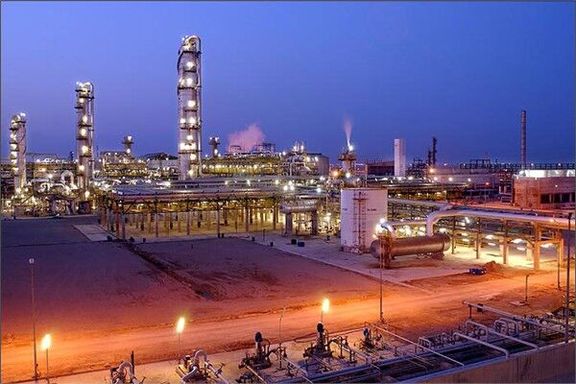
Russian energy giant Gazprom and the National Iranian Oil Company have signed a $40-billion memorandum-of-understanding on the eve of President Putin’s visit.
The current worth of Russia’s contracts in Iran's oil and gas fields is $4 billion, but Iran’s state news agency IRNA says if the new MoU leads to any contracts, Moscow’s total investment will increase 10-fold to $40 billion.
The agreement, as announced by the oil ministry’s Shana news agency, covers development of the Kish and North Pars gas-fields, as well as six oil fields.
It was penned during an online ceremony by the companies’ chief executives on the day Vladimir Putin arrives for a three-way summit with Iran’s President Ebrahim Raisi and Turkey’s President Recep Tayyip Erdogan.
The most significant aspect of the Gazprom-NIOC memorandum for Iran may be access to technology for LNG (liquid natural gas), which Tehran once hoped to access through agreements with western majors, especially Total, that withdrew in the face of United States ‘maximum pressure’ sanctions after 2018.
North Pars has around 33,000 billion cubic feet (bcf) of gas, and Kish gas-field 8,300 bcf. Both are currently at the feasibility stage.
While Iran has the world’s second largest gas reserves after Russia, it has been slow to develop its fields and boost exports in the face of sanctions.
Putin’s visit is being watched close with the expectation of closer links between Moscow and Tehran, boosting trade from just $4 billion in 2021, with both subject to international sanctions and as the Ukraine crisis pushes up global oil and food prices.
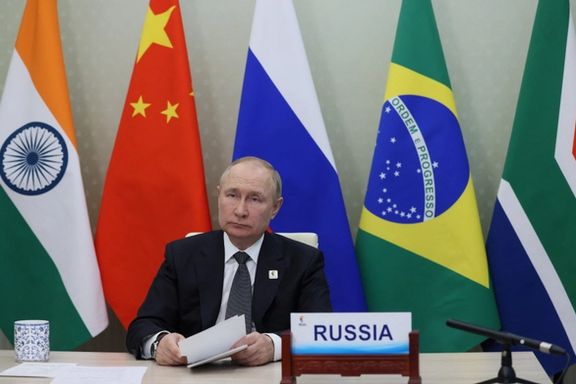
Russia's Vladimir Putin arrives in Iran on Tuesday, in a visit much anticipated by the hardliner government in Tehran and hailed as a major anti-West event.
The formal reason for Putin’s visit is a tripartite summit with his Iranian and Turkish counterparts to discusses Syria, where Tehran and Moscow back Bashar al Assad and Turkey backs the residual rebel forces in the north of the country.
Turkey's President Rcep Tayyip Erdogan also arrive in Tehran and received by President Ebrahim Raisi.
However, Iranian government-owned media has been portraying the visit as a major event to counter the West. Fars news website affiliated with the Revolutionary Guard on Tuesday splashed a headline decaling, “The end of Western monetary and financial hegemony”.
Presumably, Iran and Russia are setting up a mechanism to interchange currencies, but the outline is so vague it is impossible to clearly describe it.
Last week, the US National Security Adviser Jake Sullivan twice warned that Iran might provide military drones to Russia to be used in the Ukraine war. Iran’s foreign ministry tried to deny it, saying Tehran is neutral in the war and will not aid any side.
US State Department spokesperson Ned Price on Monday [July 18] reiterated that Washington is monitoring the situation. “Well, we’ve spoken about our concerns regarding a potential Iranian provision of UAV technology to Russia. We will continue to watch very closely. All of our sanctions remain in force,” he said, adding that such a transaction might violate of host of American and other sanctions on the two countries.
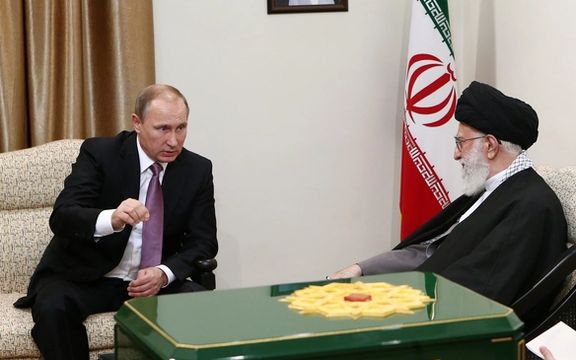
Despite their political alliance, which since the invasion of Ukraine has increasingly taken an anti-Western tone, economic transactions between Iran and Russia remain small.
Bilateral trade rose to $4 billion in 2021, but this is far less than, for example, Russia’s trade with Turkey at $33 billion, while Moscow’s exports to Iran are mainly foodstuffs, which are less vulnerable to US third-party sanctions than other sectors.
Before its costly adventure in Ukraine, Russia was mindful of US third-party sanctions on Iran and there were no major cases of, for example, banking violations.
The specter of an emerging US-backed Arab-Israeli bloc that could tilt the Middle East balance of power further away from Iran has accelerated its clerical rulers' efforts to strengthen strategic ties with the Kremlin.
"Considering the evolving geopolitical ties after the Ukraine war, the establishment tries to secure Moscow's support in Tehran's confrontation with Washington and its regional allies," Reuters quoted an unnamed senior Iranian official as saying.
Sending a clear message to the West that Russia will seek to boost ties with anti-West Iran, Putin will meet the Islamic Republic's most powerful authority, Supreme Leader Ayatollah Ali Khamenei, just a few days after US President Joe Biden visited Israel and Saudi Arabia.
Emboldened by high oil prices after the Ukraine war, Tehran is betting that with Russia's support it could pressure Washington to offer concessions for revival of a 2015 nuclear deal.
Almost a year of indirect talks between Tehran and Washington in Vienna stalled in March, with Iran questioning the US resolve and Washington calling on Tehran to drop extra demands.
But Moscow and Tehran, both subject to US sanctions, have overlapped interests. Iran, whose oil industry has struggled for years under US sanctions, has long relied on exports to China to keep the economy afloat. Since the start of Ukraine war, Moscow has taken away a big chunk of Iran's oil market in Asia.
In May, several reports said that Iran's crude exports to China have fallen sharply as Beijing favoured heavily discounted Russian barrels, leaving almost 40 million barrels of Iranian oil stored on tankers at sea in Asia and seeking buyers.